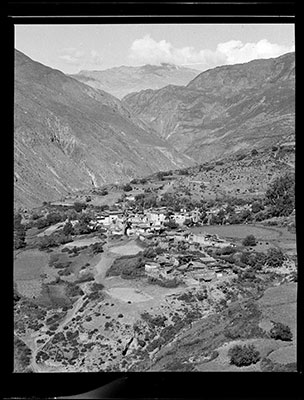
2001.59.4.33.1 (Film negative)


2001.59.4.33.1 (Film negative)

Hugh E. Richardson
Hugh Richardson
1950
Lhodrag Region > Lhakhang Dzong >
2001.59.4.33.1
54 X 43 mm
Negative film nitrate
Donated August 2001
The executors of the estate of Hugh E. Richardson
Richardson's 1950 Lhodrag tour
Manual Catalogues - Notes on negative album - '4 LHOBRAG 1950' 'Gongkar. Dzaring La. Lha khang Dzong. Sras. Pemaling Tso. Ku la kangri.' is written on the cover of the negative album in white in Richardson's hand. [KC 19/4/2006]
Manual Catalogues - Notes on negative index '4' - Folio 33. 'Do.' [LHAKHANG DZONG]
Manual Catalogues - Richardson's Handlist: 'Album 4. Journey starting at Gong-dkar rdzong on Gtsang-po, 29.18 N. 90. 48 E.[nos.] 32-34. do.' [Lho brag Lha-khang rdzong and village. c 28.4.N. 91.4 E.]
Other information - Background: Lhakhang is situated on the confluence of the Kuru chu and Tamzhol rivers. The Dzong was an important trading post between Eastern Bhutan and Tsetang, in Central Tibet. In the middle of the settlement is the Khoting Lhakhang (mkho mthing lha khang) founded by Songtsen Gampo during the 7th century. [TS 6/6/2005]
Other Information - Dates: The date is derived from Richardson’s negative album No.4, the cover of which is marked with ‘Lhobrag 1950’. These images seem mainly to have been developed as part of a batch arising from a trip to Mug, Lhobrag etc in 1950, as well as images taken on other trips during this year (eg: Talung/Reting). The batch development numbers 608-615 on the back of the contact prints run sequentially and the images seem all to have been developed at the same time, and must therefore have been taken in or around this date. In addition, 2001.59.4.83.2, one of this batch, has also been identified on the back as having been taken in 1950 [MS 22/12/2005]
For Citation use:
The Tibet Album.
"Lhakhang Dzong in Lhodrag near the Bhutan border"
05 Dec. 2006. The Pitt Rivers Museum.
<http://tibet.prm.ox.ac.uk/photo_2001.59.4.33.1.html>.
For more information about photographic usage or to order prints, please visit the The Pitt Rivers Museum.
© The Pitt Rivers Museum